Working from Home, Does It Really Work?
The Covid-19 pandemic saw most businesses shift to a work-from-home business model amid lockdowns and restrictions on gathering, particularly in the workplace. How effective is this model, really?
-

A home office
A recent LiveCareer survey stated that almost one-third of employees in the US would quit their job if they were told they were no longer allowed to work remotely. A Harvard Business Study also found that “letting workers decide where and when to do their jobs — whether in another city or in the middle of the night — increases employee productivity, reduces turnover, and lowers organizational costs.”
In an article published on TechCrunch, Karl Laughton, CEO of Insightly, said that over the past year and a half, they found happiness levels to have been "twice as high from the previous year," according to an internal survey conducted by the company.
The bottom line was clear, "You don't need an office to be productive, and employees are happier working from home."
The long-term effects of this shift are also promising, as it stands to empower women in the workplace and revitalize rural communities, with people taking advantage of remote work to shift to rural locations, escaping the hustle and bustle of city life and its high costs; not to mention the benefits brought about to companies, with reduced costs and a wider pool of recruits to choose from.
This all seems rosy, with the science being cut and clear on the subject; but it's not, as a recent TIME article pointed out, "The pandemic will not be 'the death of the office,' as some have suggested, but working from home also won't become entirely a thing of the past."
The result is neither here nor there, as the shift seems to be headed towards a "structured hybrid model," because remote work cannot be long-term for most jobs.
Yes, remote work brings about increased productivity, but it just isn't feasible for most jobs, especially technical jobs that require minimal teamwork.
Remote work, which includes negatives for employers such as being away from their employees, losing supervision over them, and being unable to see whether they are working hard from up close, also has a negative impact on teamwork as it "breaks the mechanisms that allow a team to work together creatively."
Studies have shown that creative work is at its best when a team "is in a state of flow," and since "flow" can't be created remotely (at least so far), then there are no technologies for employers to embrace for the shift of moving toward remote work. The numbers show this, "Utah-based virtual whiteboard app Lucidspark found that 75% of 1,000 respondents surveyed in September last year said collaboration was the thing that suffered most when working remotely."
So far, for most workers, remote work just isn't cutting it, but as things shift towards a new normal in the workplace, the hybrid model seems the most promising for the future.

 3 Min Read
3 Min Read








